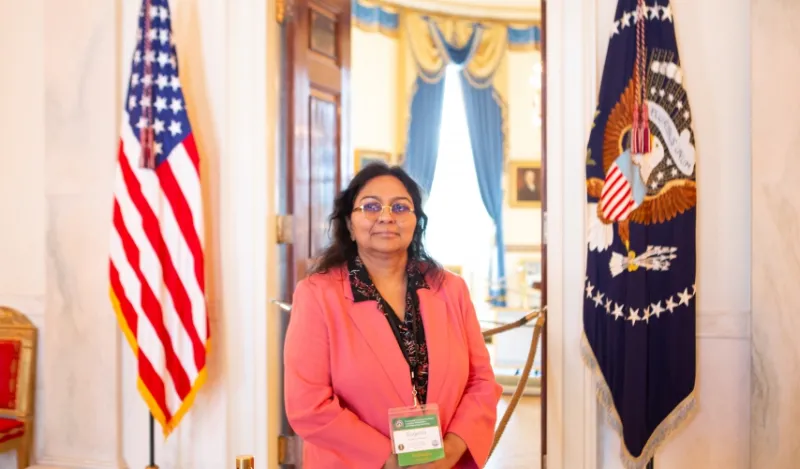
On October 17, 2019 Dr. Eugenia Paulus, NHCC chemistry faculty, was recognized with a Presidential Award for Excellence in Science, Mathematics and Engineering Mentoring (PAESMEM) which is facilitated by the White House Office of Science and Technology Policy and the National Science Foundation. Dr. Paulus is the only community college faculty member from Minnesota and one of only two individuals from the state to receive this award dating back to its inception in 1995. The PAESMEM recognizes the critical roles mentors play outside the traditional classroom setting in the academic and professional development of the future STEM workforce. Enjoy this Q&A with Dr. Paulus.
Who nominated you for this award?
There is no one nominator – it is a combination of several factors – workshops I conducted and presentations I gave all over the country on student mentoring, people who worked with me on projects supported by the National Science Foundation (NSF), NHCC alumni and others (high school students through Minnesota Academy of Science, and students who live in my community through Education Enhancement Group EEG) who together supported and submitted a nomination to the White House Office of Science Technology Policy.
What is the difference between your role as an educator and a mentor?
In my book of definitions, a teacher transmits information to students and an educator effectively communicates information in a manner that a student can use that information to be successful, for example in taking a pre-professional exam, GRE, etc.
I like the idea of a mentor that I heard an English teacher say, “The original Mentor is a character in Homer’s poem The Odyssey. When Odysseus went to fight in the Trojan War, he entrusted his son to Mentor, who served as his tutor and guardian. Mentor was not only responsible for the boy’s education, but also for shaping his character, for the wisdom of his decisions and for the clarity of his life’s purpose.” A mentor is a leader committed to student success through structured dialogue and reflection with a student; an individual with the awesome opportunity to transform the lives of students; a person who helps a student realize their dreams and helps them acquire the skills that can be used in the academic arena, the workforce and real life; a confidential advocate, a role model, a passionate caring educator who adopts the responsibility of empowering students.
What are some of your mentees doing today?
I have mentees in many different areas: students at higher education institutions, physicians, pharmacists, dentists, hospital administrators, veterinarians, school teachers, professors at universities, researchers in geriatric care and neuroscience and healthcare analytics, ophthalmologists, and biomedical or material science engineers.
Who was your mentor?
My parents were my first mentors. As an undergrad in India, a chemistry professor changed my path from mathematics to chemistry. In Minnesota, Sharon Sechrist, an organic chemistry professor at Minneapolis Community and Technical College; and Dr. Tolbert at National Science Foundation.

